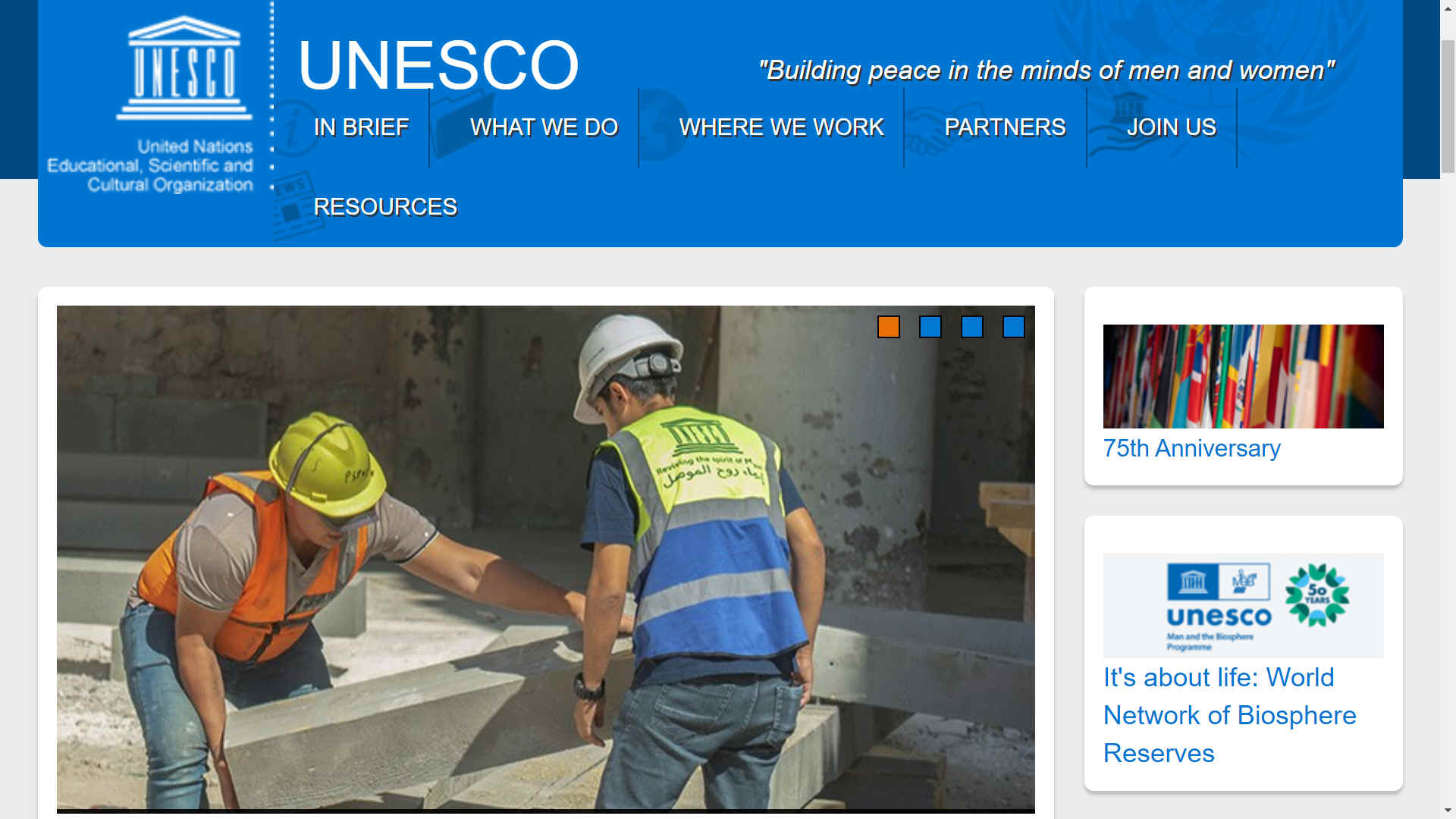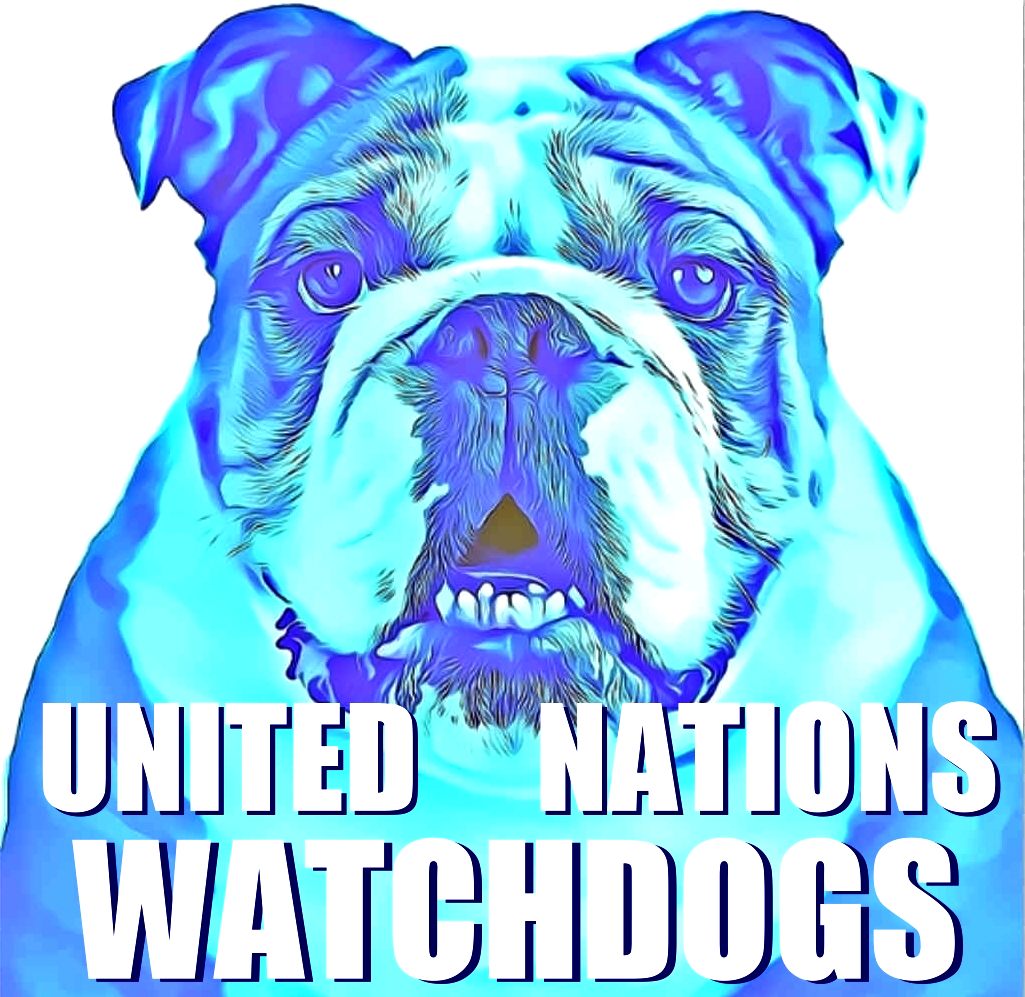|
UNESCO
& THE BLUE SHIELD
Please use our
A-Z INDEX to
navigate this site or see HOME
|
|

HISTORY OF BLUE SHIELD
The first international treaties to protect cultural property from the effects of armed conflict date to the 19th century, and have continued to evolve. Following the widespread destruction of cultural heritage during the
Second World
War, the 1954 Hague Convention for the Protection of Cultural Property in the Event of Armed Conflict was written to create rules to protect cultural property during armed conflicts. This Convention was the first widely adopted international treaty to focus exclusively on the protection of cultural heritage in the context of war, and which highlighted the concept of common heritage. (The first treaty was the Roerich Pact of 1935, but this was never adopted outside the Americas.)
In order to protect endangered cultural heritage, the International Committee of the Blue Shield was created in 1996 by the four non-governmental organisations, which represent professionals active in the fields of archives, libraries, monuments and sites, and museums:
- ICA: International Council on Archives
- ICOM: International Council of Museums
- IFLA: International Federation of Library Associations and Institutions
- ICOMOS: International Council on Monuments and Sites
The four organisations worked together to prepare for, and respond to, emergency situations that could affect cultural heritage. They were joined in 2005 by the CCAAA (Co-ordinating Council of Audiovisual Archives Associations), who later left in 2012. In 2008, the Association of National Committees of the
Blue Shield
(ANCBS) was established to coordinate the work of the national committees.
They took up the emblem of the 1954 Hague Convention as the symbol of the International Committee of the Blue Shield, in line with Article 17 of the Convention.
The distinctive emblem may be used alone only as a means of identification of: (b) the persons responsible for the duties of control in accordance with the Regulations for the execution of the Convention;
By the time the Second Protocol to the Hague Convention was written in 1999, the ICBS was a recognised advisory body to the Inter-Governmental Committee for cultural property protection in armed conflict.
THE IMPORTANCE OF CULTURAL HERITAGE
The Blue
Shield’s work is founded on the belief that cultural heritage – tangible and intangible – is important. It is a vital expression of the culture that makes up unique communities and its loss during conflict and disaster can be catastrophic.
Cultural heritage is the heritage we have inherited: our legacy, our memories, physical places, objects and intangible beliefs and practices, and so much more. Intangible heritage can often be associated with particular tangible cultural heritage. For example, placing poppies on a war memorial is a practice commemorating an event, but it takes place at a physical location. In Australia, many aboriginal groups have detailed practices passed down for many generations which are integral components of places in the landscape. Our heritage – physical and non-physical – is an important part of who we are and what we identify with, as individuals and communities.
This cultural identity relies on the memory of communities and individuals: it is key to identity, well-being, decisions and actions. Although memories are not always positive, and can be contested, they are an integral part of individuals, communities and societies. Cultural property is a powerful tool in determining what is remembered – and what is forgotten or obscured. For example, after conflicts and disasters, buildings can provide visible symbols of who is given priority in rebuilding if the community is divided – or who is not given permission at all.
Blue Shield strives to prevent the loss of heritage to communities, recognising that it is a fundamental part of their wellbeing. There are several key reasons for this.
1. CULTURAL/SOCIETY
2. POLITICAL
3. INTERNATIONAL HUMANITARIAN LAW
4. HUMAN RIGHTS LAW
5. MEDICAL/WELLBEING
6. SUSTAINABLE ECONOMIC DEVLOPMENT
7. ACADEMIC VALUE
|
INTERNATIONAL INITIATIVES
The work of The Blue Shield is informed by international legal instruments, but also by the international cultural protection agenda set by the UN and UNESCO, and by international initiatives regarding environmental disaster.
SENDAI FRAMEWORK FOR DISASTER RISK REDUCTION
The Sendai Framework is a 15-year, voluntary, non-binding agreement which recognizes that the State has the primary role to reduce disaster risk but that responsibility should be shared with other stakeholders including local government, the private sector and other stakeholders. It aims for the following outcome:
The substantial reduction of disaster risk and losses in lives, livelihoods and health and in the economic, physical, social, cultural and environmental assets of persons, businesses, communities and countries.
THE SEVEN GLOBAL TARGETS
(a) Substantially reduce global disaster mortality by 2030, aiming to lower average per 100,000 global mortality rate in the decade 2020-2030 compared to the period 2005-2015.
(b) Substantially reduce the number of affected people globally by 2030, aiming to lower average global figure per 100,000 in the decade 2020 -2030 compared to the period 2005-2015.
(c) Reduce direct disaster economic loss in relation to global gross domestic product (GDP) by 2030.
(d) Substantially reduce disaster damage to critical infrastructure and disruption of basic services, among them health and educational facilities, including through developing their resilience by 2030.
(e) Substantially increase the number of countries with national and local disaster risk reduction strategies by 2020.
(f) Substantially enhance international cooperation to developing countries through adequate and sustainable support to complement their national actions for implementation of this Framework by 2030.
(g) Substantially increase the availability of and access to multi-hazard early warning systems and disaster risk information and assessments to the people by 2030.
THE FOUR PRIORITIES FOR ACTION
Priority 1. Understanding disaster risk
Priority 2. Strengthening disaster risk governance to manage disaster risk
Priority 3. Investing in disaster risk reduction for resilience
Priority 4. Enhancing disaster preparedness for effective response and to “Build Back Better” in recovery, rehabilitation and reconstruction
|
|
CONTACTS - REGISTERED NATIONAL COMMITTEES
Blue Shield International
School of Arts and Cultures
Armstrong Building
Newcastle University
NE1 7RU
United Kingdom
https://theblueshield.org/
Argentina Committee of the Blue Shield
Contact: Luciana Micha, Coordinator
Email: Blueshield.Argentina (a) theblueshield.org
Australia Committee of the Blue Shield
Contact: The Secretary, Blue Shield Australia
Email: Blueshield.Australia (a) theblueshield.org
Website: http://blueshieldaustralia.org.au/
Facebook: https://www.facebook.com/Blueshieldaustralia
Twitter: https://twitter.com/BlueShieldAust
Austria Committee of the Blue Shield
Contact: Anna Puhr (Communications)
Email: blueshield.austria (a) theblueshield.org
Website: https://www.blueshield.at
Belgium Committee of the Blue Shield
Contact: Gustaaf Janssens, President and Christina Ceulemans, Secretary
Email: blueshield.belgium (a) theblueshield.org
Website: https://www.blueshieldbelgium.be
Cameroon Committee of the Blue Shield
Contact: Christian Tchuisseu Nana, Président
Email: Blueshield.cameroon (a) theblueshield.org
Curaçao Committee of the Blue Shield
Contact: Max Scriwanek
Email: Blueshield.curacao (a) theblueshield.org
Czech Republic Committee of the Blue Shield
Contact: Jana Souckova, Chairperson
Email: blueshield.czechrepublic (a) theblueshield.org
Denmark Committee of the Blue Shield
Contact: Søren la Cour Jensen, Chairperson
Email: blueshield.denmark (a) theblueshield.org
Website: https://blueshield.dk/
Facebook: https://www.facebook.com/blueshielddanmark/
France Committee of the Blue Shield
Contact: Françoise Collanges
Email: blueshield.france (a) theblueshield.org
Website: http://www.bouclier-bleu.fr/
Facebook: https://www.facebook.com/groups/78097965526/
Georgia Committee of the Blue Shield
Contact: Manana Tevzadze, Chairperson
Email: blueshield.georgia (a) theblueshield.org
Website: https://www.blueshield.ge
Facebook: https://www.facebook.com/blueshieldgeorgia
Twitter: https://twitter.com/blueshieldgeo?lang=en
Germany Committee of the Blue Shield
Contact: Susann Harder, Präsidentin
Email: blueshield.germany (a) theblueshield.org
Twitter: https://twitter.com/blueshield_ger
Website: www.blue-shield.de
Greece (Hellenic) Committee of the Blue Shield
Contact: Elena Korka
Email: blueshield.greece (a) theblueshield.org
Facebook: https://www.facebook.com/hellenic.committee.blue.shield
Website: https://hellenicblueshield.com/en/home/
Guatemala Committee of the Blue Shield
Contact: Samuel Franco
Email: blueshield.guatemala (a) theblueshield.org
Iceland Committee of the Blue Shield
Contact: Heiðar Lind Hansson, President
Email: blueshield.iceland (a) theblueshield.org
Website: http://blaiskjoldurinn.is/
Facebook: https://www.facebook.com/blueshieldiceland/
Ireland Committee of the Blue Shield
Contact: Zoë Reid, President
Email: blueshield.ireland (a) theblueshield.org
Website: http://www.icomos.ie/index.php/blue-shield/objectives
Facebook: https://www.facebook.com/IrishBlueShield/
Twitter: https://twitter.com/irishncbs?lang=en-gb
Lebanon Committee of the Blue Shield
Contact: Randa Chediac
Email: blueshield.lebanon (a) theblueshield.org
Macedonia Committee of the Blue Shield
Contact: Olivera Dzartovska-Tachevska, President
Email: blueshield.macedonia (a) theblueshield.org
Website: www.blueshield.org.mk
Mali Committee of the Blue Shield
Contact: Mamadou Samaké, President
Email: blueshield.mali (@) theblueshield.org
Netherlands Committee of the Blue Shield
Contact: Angela Dellebeke
Email: blueshield.netherlands (a) theblueshield.org
LinkedIn: https://www.linkedin.com/groups/12602074/
Facebook: https://www.facebook.com/BlueShieldNL/
Niger National Committee of the Blue Shield
Contact: Adamou Danladi, President
Email: Blueshield.Niger (@) theblueshield.org
Norway Committee of the Blue Shield
Contact: Håkon Roland, Chair
Email: post (a) blueshield.no
Pasifika Committee of the Blue Shield
Contact: Adi Meretui Ratunabuabua, Chair
Email: blueshield.pasifika (a) theblueshield.org
Facebook: https://www.facebook.com/Blue-Shield-Pasifika/
Peru Committee of the Blue Shield
Contact: Ricardo Daniel Rivera Velásquez, Secretary
Email: blueshield.peru (a) theblueshield.org
Website: www.blueshield.pe
Poland Committee of the Blue Shield
Contact: Krysztof Salacinski, Chair
Email: blueshield.poland (@) theblueshield.org
Facebook: https://www.facebook.com/PolandBlueShield
Website: http://blekitnatarcza.org/
Turkiye National Committee of the Blue Shield
Contact: Ömer Dabanli, Chair
Email: blueshield.turkey (a) theblueshield.org
Twitter: https://twitter.com/BlueshieldT/
Senegal Committee of the Blue Shield
Contact: Mr Hamady Gaye, General Secretary
Email: blueshield.senegal (a) theblueshield.org
Slovakia National Committee of the Blue Shield
Contact: Zuzana Menzlova, President
Email: blueshield.slovakia (@) theblueshield.org
Republic of Korea Committee of the Blue Shield
Contact: Ms Inkyung CHANG, Chair of ICOM Korea
Email: blueshield.repkorea (@) theblueshield.org
United Kingdom Committee of the Blue Shield
Contact: Emma Cunliffe, Secretary
Email: Blueshield.UK (a) theblueshield.org
Website: http://ukblueshield.org.uk/
Facebook: https://www.facebook.com/ukblueshield/
Twitter:https://twitter.com/ukblueshield?lang=en
USCBS (United States Committee of the Blue Shield)
Contact: Karen Hutchinson
Email: blueshield.unitedstates (a) theblueshield.org
Website: https://uscbs.org/
Facebook: https://www.facebook.com/groups/63752022657/
Twitter: https://twitter.com/uscbs_org
LINKS
& REFERENCE
http://www.unesco.org
https://ioc.unesco.org/
http://www.unesco.org
https://ioc.unesco.org/
|
|
WORLD
PEACE -
May only be achieved when member nations fully
endorse and action sustainable development, such that food, energy, housing
and industry all work together like a well oiled machine, in harmony with
nature. Working in harmony, means not over-exploiting mother earth's natural
resources, not killing flora or fauna past their recovery limits, and not
adding to global
warming.
|
|

Please use our
A-Z INDEX to
navigate this site, or return HOME
|
|
This website is Copyright ©
2022 Climate Change Trust & Injustice Alliance The views, performance reviews and opinions of the Trust are protected by Articles 18 and 19 of the Universal Declaration of Human Rights.
|

